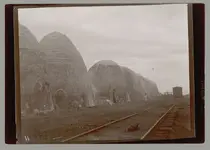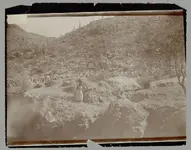HOLA amigos,
This is a VERY long reply, so I must beg your indulgence.
Cactusjumper wrote
The Spanish were experts at extracting treasure and secrets from anyone. They left no stone unturned. Even cesspools were searched. They found nothing, not even stories of treasures being spirited away. They were shocked that they came up empty handed.
I would like to see a reasonable explanation of why the priests put their names on these treasures. In those days, their names would have no effect on value. The only reason that makes sense, is that the marcos were being set aside to pay the priests for the missions goods.
I am convinced the Spanish failed on several counts, for one they were dealing with the Padres and not with the Lay Brothers, whom appear to have been the real operators of most or all of the so-called "Jesuit" mines. So no information could ever be extracted, as they had no knowledge in general. The other problem is that of shill-ownership of various assets; these are even listed among the assets discovered by the Spanish authorities, whom did not recognize that the true ownership.however was the Order. The Jesuit missions were financially successful (in general) and at least in New France, had their own ships for carrying their own needs and produce. Their very success led to great jealousies and suspicions, and we know the rest of the story.
As for HOW these numerous legends of lost Jesuit treasures, mines etc came about, I cited one example in another thread - where a Jesuit father held the safebox for the authorities, and hid it during Indio troubles - think of how this was interpreted by Indio witnesses. Then recall that most (if not all) of these legends of lost Jesuit treasures originate from Indio stories passed down and devoured by treasure hunters who preserved (and embellished upon) them. We might well take note that virtually all of the Jesuit missions and even the visitas were equipped with beautiful and costly trappings, and that virtually NONE of these costly trappings were found by the Spanish authorities. (Or the French authorities when they were expelled from the French colonies.) Someone hid these treasures, and they are worth a great deal today. Here is one example, and penned by Father Keller, whose actions are suspected of being one of the key causes of the Pima revolt
My Reverend Father Gaspar Stiger,<snip>
I came to Terrenate yesterday to hide the ornaments of the church and a family.
Terrenate, November 28, 1751
Your Humble Servant, Keller
If Your Reverence should see the Father Visitor and Juan, give them my affection.
letter from Ignacio Xavier Keller SJ to Gaspar Stiger SJ, Terrenate, November 28, 1751
(AGI, Guadalajara 419, 3m-49, page 2)
Again consider what an Indio might conclude, witnessing father Keller hide these beautiful objects, with the revolt developing. How would our Indio report this incident when passing it down to the grandchildren, and from them on to our treasure hunters? Remember most Jesuit treasure legends can be traced to Indians telling some treasure-hunter friend, who then published it.
I would also point out that the Jesuit fathers were ministering to the various mining camps, now consider how an Indio might see this when they would see the Padre's visits to the mines. Would the Father not be treated with great deference, even reverence by the mine operators? An Indio might see this behavior and logically deduce that the Padre must be the owner.
As for pointing out some "bad actors" we could list Fathers Garrucho, Keller, Tello SJ for starters, and take note that one of the key conditions for ending the Pima revolt of 1751 was
that Keller must leave the area. It only takes a handful of bad actors for a whole group to get a bad name, however unjustly.
Lamar wrote
et si oculus tuus scandalizat te erue eum et proice abs te bonum tibi est unoculum in vitam intrare quam duos oculos habentem mitti in gehennam ignis
Hoo boy way too much Latin in one sentence, especially for those who delude themselves into believing their "self-taught" interpretation is in any way accurate! (heh heh) Thank you for translating.

Lamar also wrote
Why single out one certain Order for accusations? Why accuse the Jesuits and not include the Franciscans or the Domincans? Perhaps it was because those two Orders tended to follow and enforce the secular laws of the lands in which their missions were situated? In other words, they seemed to be much more adept at playing the political game than the Jesuits were and they tended to not want to upturn the applecart.
I am mystified at this situation as well, and would point out that the Franciscans do in fact have quite a large number of treasure legends associated with them - however
these are largely ignored by the treasure hunting community. In Texas, New Mexico and elsewhere these legends are circulated but they are just not popularly known. In Arizona, we know that the Franciscans took over the Jesuit missions after their expulsion, but the Franciscans were far less successful - they WERE actively involved in mining, at least in those few cases where they were able to re-discover earlier mines, but it seems the Apache problem had become so intolerable that "civilization" was in retreat rather than advance while they held sway. As for the Dominicans, their behavior is far more questionable in many instances, I think the only reason we do not have legends of lost Dominican treasures in the American southwest is because of their absence.
As our mutual amigo Furness pointed out, we have a number of folks who defend the Jesuits and deny all such activities, but in the case with the Franciscans, we have no such denials.

Lamar also wrote
Dear cactusjumper;
I particularly liked how she worded:
The religious cult absorbed considerable community resources.
Does this mean that I, as part of the largest organized religion in the world, am actually a member of a cult

Someone ought to inform the Pope, I think...
Your friend who is writing a letter to Rome;
Cult is a matter of definition, according to one source
most of us here would qualify - for anyone who believes in some invisible super-being is one definition of a "cult" member.




Lamar also wrote
While there does not exist even the slightest scrap of proof that the Domincans and/or Franciscans had a role in spreading hate and dissention about the Jesuits among the secular colonists, it would seem that they perhaps played a role in the expulsion of the Jesuits.
Bingo, give that man a cigar!

These little "accusations" are not to be found in any written record for that is not how they were dispensed and circulated, but rather by whispers into the ears of already suspicious, jealous secular authorities.
As evidence that this in fact took place, I point to the fact that it was the good Franciscans whom were appointed to take over the Jesuit missions of Sonora, and these Padres did their own searches for the possessions of the Jesuits.
Cactusjumper wrote
it gets us outdoors and gets the stink blowed off
ROFLMAO 



haven't heard that in years, my mother used to point it out as one of the good benefits of having to work outdoors on particularly windy nasty days!

Don Jose de la Mancha wrote
D)
Why was the resident Priest at Yecora soo agitated upon seeing my logo of Tayopa and insisted in my going to Yecora for a full night of talk of Tayopa and drinking coffee??
I still hope to hear from you about this conversation sometime....


Oroblanco



 It's a pee poor treasure hunter that doesn't have a copy on his bookshelf.
It's a pee poor treasure hunter that doesn't have a copy on his bookshelf.
 My Bad!
My Bad! I would recommend "Wandering Peoples" by Cynthia Radding to get a better feel for the wealth and finances of the missions. As a side note, I don't believe Ms. Radding was a fan of the Jesuits.
I would recommend "Wandering Peoples" by Cynthia Radding to get a better feel for the wealth and finances of the missions. As a side note, I don't believe Ms. Radding was a fan of the Jesuits.







 haven't heard that in years, my mother used to point it out as one of the good benefits of having to work outdoors on particularly windy nasty days!
haven't heard that in years, my mother used to point it out as one of the good benefits of having to work outdoors on particularly windy nasty days! 
